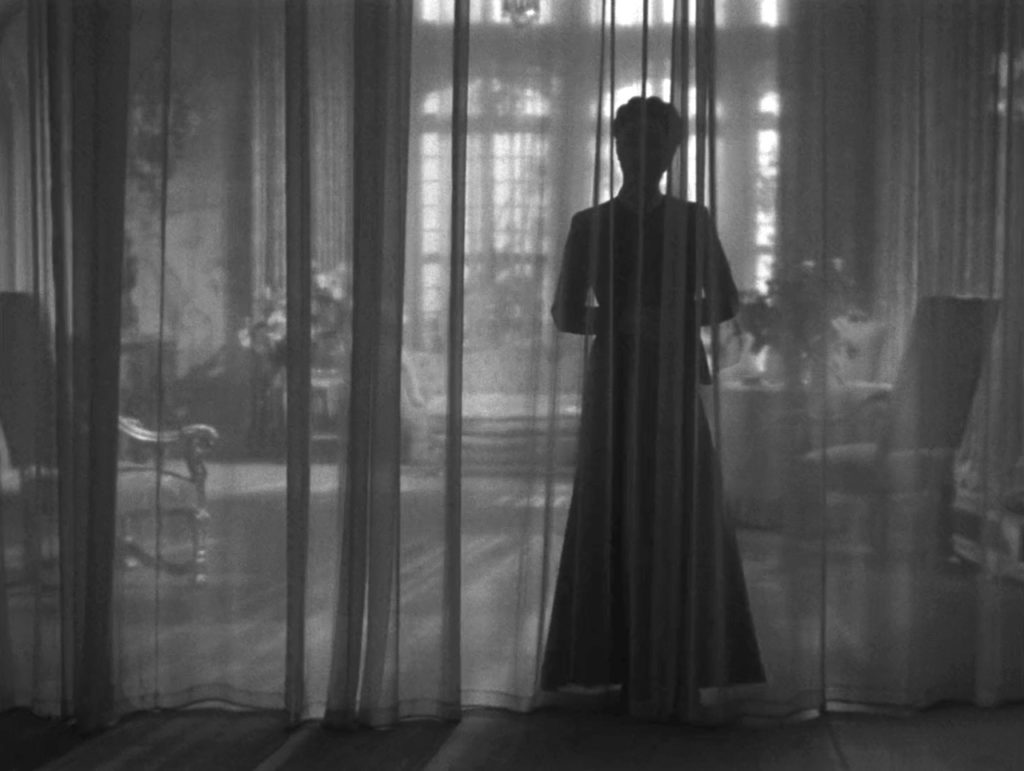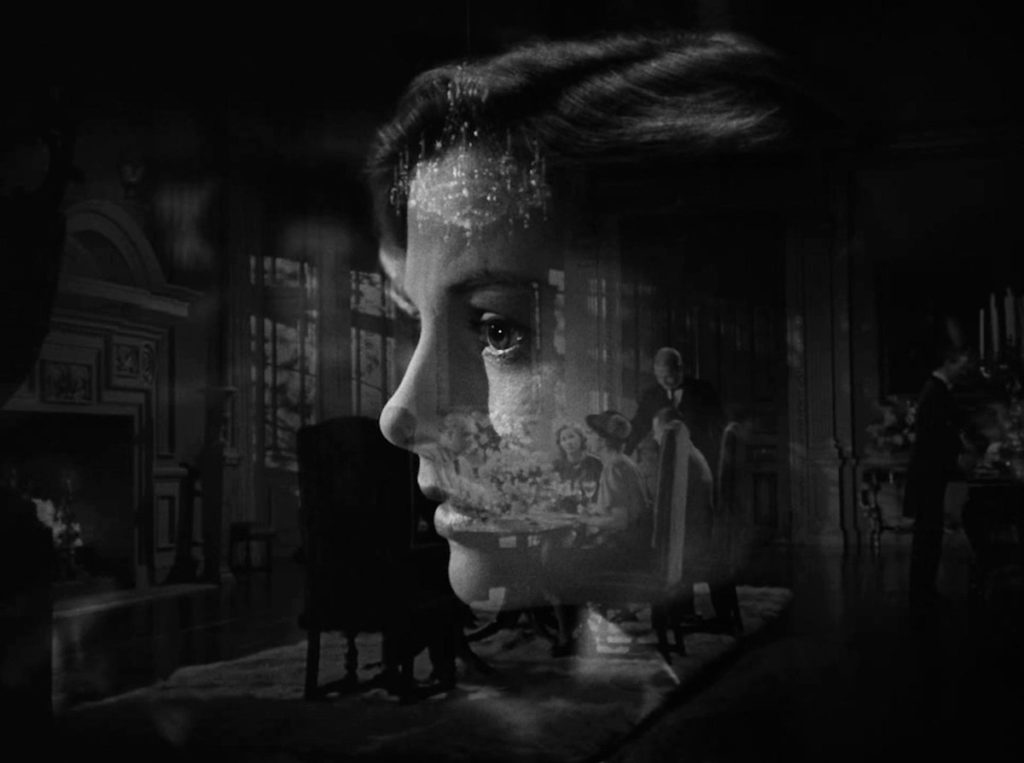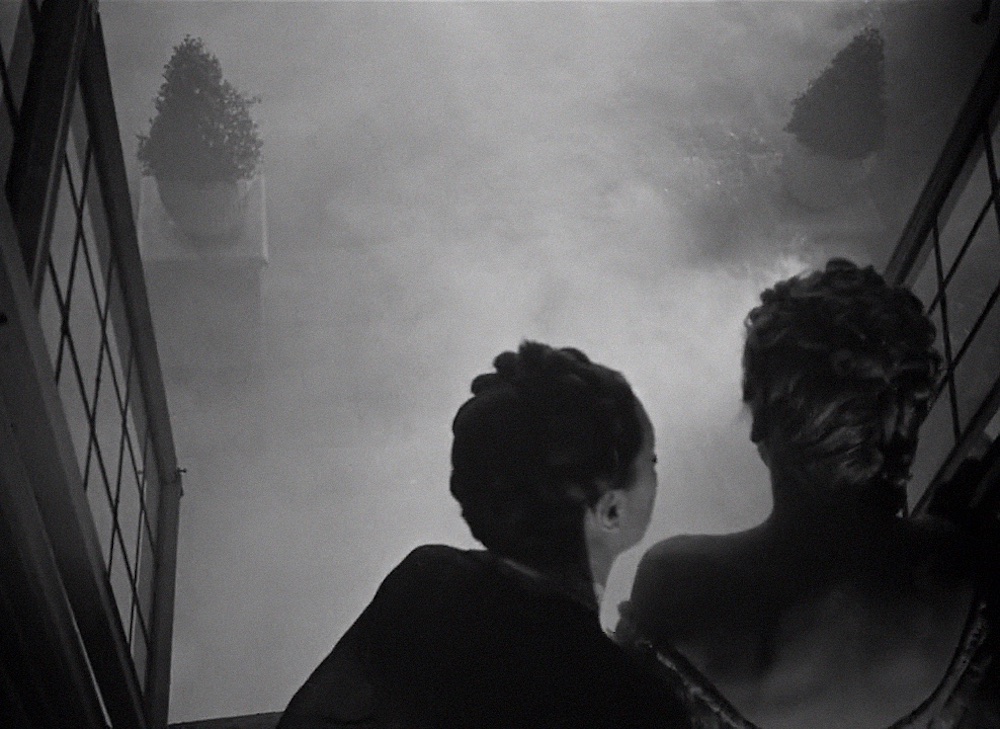| Jake Rudegeair |

Rebecca plays at the Heights Cinema on Thursday, April 13. Visit trylon.org for tickets and more information.
“Look. You can see my hand through it.”
– Mrs. Danvers (Judith Anderson) in Rebecca
Warning: plot spoilers below!
Float down the overgrown drive, supernatural dreamer, until you come upon the “desolate shell” of Manderley. This classic haunted house holds up the deceits and revelations of Rebecca, Hitchcock’s Best Picture winner from 1940, based on the novel by Daphne du Maurier. Wide shot reigns supreme in Manderley, leaving plenty of space for the shuffling forms of repressed characters, and even a grief-stricken spaniel. But we never forget that the ocean is waiting beyond the high walls. It waves at us early on in Rebecca, lapping at the imagination, sinister and huge and empty.
Like any of my favorite Hitchcock flicks, there’s a cluster of central characters driving the drama. Shadows claw at their faces while they pine for something out of reach, whether it’s a desperate desire or a traumatic memory in translucent lace. But it’s the absent character who outdoes them all. The ghost of Rebecca propels the action, like wind filling the sail of a cursed skiff.
Laurence Olivier as Maxim de Winter (a character true to his name, with sharp little phrases that give us glimpses of demons in the deep) is an early example of Hitchcock’s archetypical male anti-lead. He’s handsome and magnetic, but oddly changeable. He gives the impression of something striking up at him from below the surface, breaking through every now and then to assault and confuse. He also wields a playful hint of a smile and a relaxed physicality that’s borderline languid.
Joan Fontaine on the other hand feels like a protagonist alone on a ledge by the sea in the pantheon of Hitchcock’s female leads. No less enchanting of course, but perhaps less confident than Joan Chandler sharing cocktails with a slimy murderer (Rope), less self-possessed than Grace Kelly’s Lisa Carol Fremont (Rear Window), and without the cold exacting intellect of Ingrid Bergman’s Dr. Petersen (Spellbound).
Fontaine spirals and lurches through Manderley. She curses her lack of grace, always rubbing her arms together like a fly trying to melt into the wall. We sympathize with the nameless character (just a kid at 21) who’s thrust into a funereal fiefdom where “everyone looks [her] up and down as though [she] were a prized cow.” We’re drawn to her openness, sincerity, and what appears to be honest love for Maxim. It hurts to watch her get yanked into the shadows by her fickle husband, and by the formidable Mrs. Danvers who looks like she might slice Fontaine in half with nothing but her face.

Speaking of Mrs. Danvers, Judith Anderson places third in billing but first in our charred, mournful hearts. She could (and should) be embraced as the secret lead of Rebecca. In every scene she skulks through she’s pulled taut as a drum—hammering out a forbidden beat of longing for the lost lady of the house.
Viewers and critics often identify her as the villain (she and George Sanders’ smarmy, self-satisfied car salesman Favell). She’s earned labels like “evil,” “wraith,” or “monster.”1 Obviously this reading undercuts our enthusiasm for a very early example of queer representation in repressive 1940s Hollywood (Mrs. Danvers is deeply in love with the late Rebecca). Watching this film again in 2023, it’s clear why the Danvers-as-villain take persists. She’s haunting and severe. She’s draped in black, and seems indifferent to Mrs. de Winter’s desperate tears—even cruelly coaxing her to jump from a second story window (ok, that moment is pretty twisted).
Far be it from me to critique this reading from significantly more qualified critics than I. Still, there’s much more to Mrs. Danvers than scorn and subterranean lust. In the famous scene where she leads Joan Fontaine around Rebecca’s room, sun bursting through the massive windows, there’s abundant evidence of her tenderness toward the deceased. When she lays a soft fur sleeve across Mrs. de Winter’s cheek, she’s trying to share in the sentiment. Even the music strays from the traditional Hitchcockian severity in this scene. It lulls and twinkles between minor notes that stretch with grief (the incongruent music would make a great subject for an entire essay, actually).
In the end, her burning of Manderley isn’t an act of cruelty, but one of romance and absolution. She’s undone by the loss of the woman she loved, and avenges her beneath the blazing ruin of an intimate shrine-turned-funeral-pyre.
It’s a cringey early example of the “bury your gays” trope in the Production Code Hollywood of 1940, but nowhere in the script is there an implicit rejection of Mrs. Danvers’ sexuality. On the contrary, the film ends with a fiery indictment of the circumstances that forced her to suppress it. It’s not the culmination of their passion that leads to disaster. It’s the compounding revelations of deceit that ignite Danvers’ violent retribution. And we’re left to wonder if the very close relationship between the two women ever boiled over into requited romance, as her delicate token of devotion immolates before our eyes in the final moment.

But let’s not leave an empty hole where the titular specter should be. Rebecca is the one who leaves behind a dismal pit at the center of the film, and everyone swirls around it, circling the drain of their honor, their innocence, and their love, respectively. The ghost can become anything the characters want her to be now that she’s gone. Even her closest confidants have spun their own post-Rebecca fantasies. It’s not until the third act visit with Dr. Baker that Favell (who I’m just now realizing looks like a similarly slimy Tom Wambsgans from Succession) and Mrs. Danvers discover the secret that Rebecca had kept from all of them. It’s a good old-fashioned twist, and it hits like the concrete floor of a dilapidated seaside shack against a recently diagnosed human skull.
The aftershock leaves you with even more emptiness: the unborn child of a brash affair. It’s a vacuum that Favell had bet his blackmail on, and the tipping point of Maxim’s torment. Audiences of the time would’ve been scandalized at the suggested infanticide, only to have the child disappear in an ocean haze as suddenly as it had come, like it never existed—which, of course, it didn’t.
Emptiness and negative space are everywhere in Rebecca, contrasted against the characters desperately trying to keep it at bay. During the confrontation in Maxim’s car outside the (bizarrely rustic) courthouse, Favell demands that his driver “fill [his] car, it’s almost empty.” The same car he uses a second later as a euphemism for Rebecca, his married lover. Moments before that, Mrs. de Winter faints away from her front row seat in court because, according to Maxim, she has an empty stomach and needs some breakfast. There are empty hallways and hearths, still white curtains in quiet rooms. There’s a mysterious Jane Doe whose identity is never discovered or even guessed at, an anonymous corpse upon whom the whole plot hinges. And there’s the sudden pitch-darkness in the wake of Mr. de Winter’s chilly rejoinder to Fontaine, “If you say we’re happy, let’s leave it at that.”
Hitchcock uses absence to create tension, raise questions about memory and perception, and hint at the secrets lying outside of language, cinematic or otherwise. The film is dripping with repression, punctuated by every one of Fontaine’s aching, open-mouthed revelations. Rebecca is certainly burdened by the cultural pressures of the time, but I came away feeling like Hitchcock was pushing back against them, not passively bearing them without attention or criticism. At the very least, he was gesturing toward the brutality of the unsaid and the unseen, the obscured and the sunken, pressing burnt lace against the emptiness.
You can still see his hand through it.
NOTES
1 Kendra Bean, “The Mysterious Mrs. Danvers: Queer Subtext in Alfred Hitchcock’s Rebecca,” vivandlarry.com, 6/28/11
Edited by Olga Tchepikova-Treon
